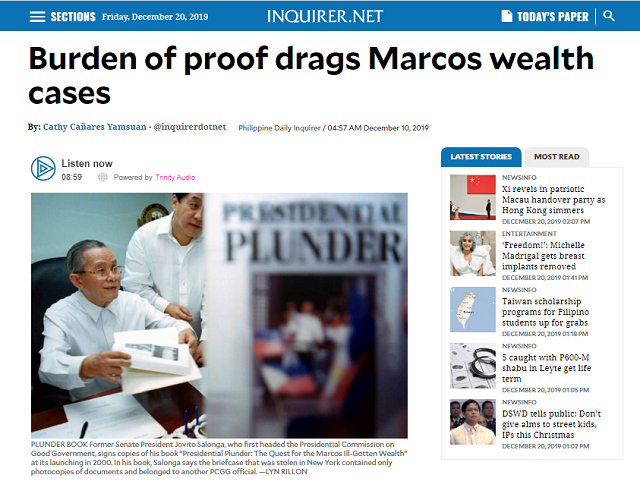A closer look: Cases on the Marcoses’ ill-gotten wealth

LAST OCTOBER 31, the Philippine Daily Inquirer editorial discussed the “prosecutorial bungling” that led to the Sandiganbayan’s dismissal of three ill-gotten wealth cases filed against the Marcoses and their cronies after EDSA.
Evidence presented by the Presidential Commission on Good Government (PCGG), the body tasked to recover ill-gotten wealth, had been rejected by the anti-graft court for being mere photocopies, violating the “best evidence rule” of the Rules of Court. The editorial asked where the original documents were, and whether the cases were being deliberately lost.
CMFR cheers the Inquirer for following up on this issue. Cathy Yamsuan’s three-part series tracked the whereabouts of the original copies of the evidence against the Marcoses, as well as the institutional lapses that hamper the swift and successful prosecution of the cases. These issues are largely unknown to the public, as more people would not even know what these cases are about anymore.
Part 1 recalled the three cases that the PCGG lost in three consecutive months this year. The report quoted Solicitor General Jose Calida, who said government lawyers were forced to present duplicates, as the real copies had been lost in New York by the late Jovito Salonga, the PCGG’s first chair, in 1986. Meanwhile, Reynold Munsayac, acting chair of the PCGG, told the Inquirer that the previous PCGG officials were responsible for submitting photocopies.
Part 2 published the side of Steve Salonga, the son of the former PCGG chair, who denied Calida’s claim that original documents had been lost. The Inquirer also included Jovito Salonga’s claim in his book “Presidential Plunder: The Quest for the Marcos Ill-Gotten Wealth” that the lost briefcase belonged to another PCGG commissioner and only contained duplicates. The elder Salonga’s letter to Inquirer columnist Belinda Cunanan in 1998 said that he personally witnessed the turnover and safekeeping of Marcos-era documents in the vaults of the Bangko Sentral ng Pilipinas, otherwise known as the Central Bank.
Parts 1 and 2 both mentioned that Calida is a known friend of the Marcoses, an issue that he and Munsayac downplayed.
Part 3 discussed the “recurring efforts” to abolish the PCGG, as well as Calida’s proposal to integrate its functions with his office. The report said the abolition threats make it difficult to recruit new and younger lawyers and professionals to work on the retrieval of the ill-gotten wealth. The office also needs the necessary funds for hiring new personnel and updating their equipment.
Is the prosecution deliberately bungling the cases? The Inquirer series provides leads that other news organizations should follow.
Leave a Reply